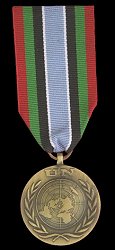UNAMIR
| United Nations Assistance Mission for Rwanda Medal | |
|---|---|
 Obverse and ribbon of the medal
|
|
| Type | Campaign medal |
| Eligibility | United Nations forces. |
| Awarded for | 90 days' service to the Mission |
| Campaign | Rwandan Civil War, Rwandan Genocide, Great Lakes refugee crisis |
| Clasps | None |
| Statistics | |
| Established | December 1993 |
The United Nations Assistance Mission for Rwanda was established by Security Council on 5 October 1993. It was intended to assist in the implementation of the Arusha Accords, signed August 4, 1993, which was meant to end the Rwandan Civil War. The mission lasted from October 1993 to March 1996. Its activities were meant to aid the peace process between the Hutu-dominated Rwandese government and the Tutsi-dominated rebel Rwandan Patriotic Front (RPF). The UNAMIR has received much attention for its role, or lack thereof due to the limitations of its rules of engagement, in the Rwandan Genocide and outbreak of fighting. Its mandate extended past the RPF overthrow of the government and into the Great Lakes refugee crisis. The mission is thus regarded as a major failure.
In October 1990 the Rwandan Civil War began when the Rwandan Patriotic Front rebel group invaded across Uganda's southern border into northern Rwanda. The RPF was composed of over 4000 soldiers, most the sons of Tutsi refugees who had fled ethnic purges in Rwanda between 1959 and 1963. It portrayed itself as a democratic, multi-ethnic movement and demanded an end to ethnic discrimination, to economic looting of the country by government elites and a stop to the security situation that continued to generate refugees. It was supported by the Ugandan government of Yoweri Museveni, who had come to power in the Ugandan Bush War with significant support from the Rwandan refugees in the country. However, the Rwandan Armed Forces (FAR) was saved by reinforcements from France and Zaire, who backed the government of Rwandan President Juvénal Habyarimana, who had been in power since 1973.
...
Wikipedia
